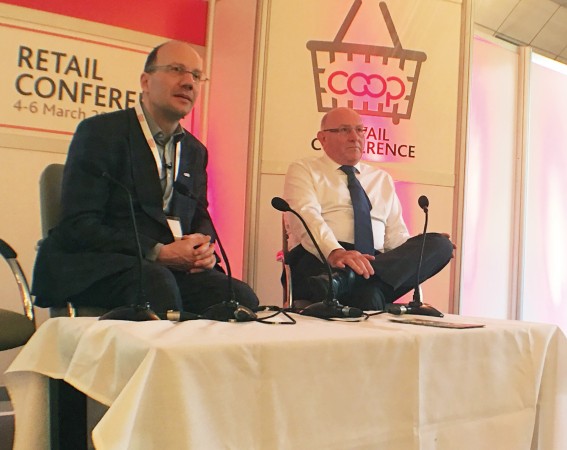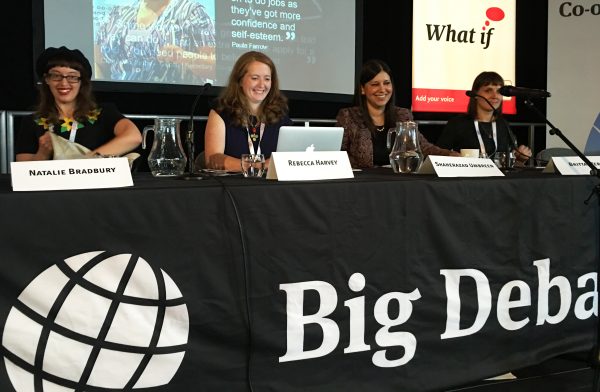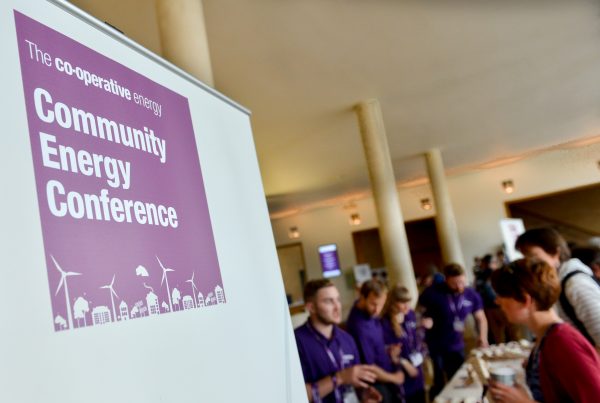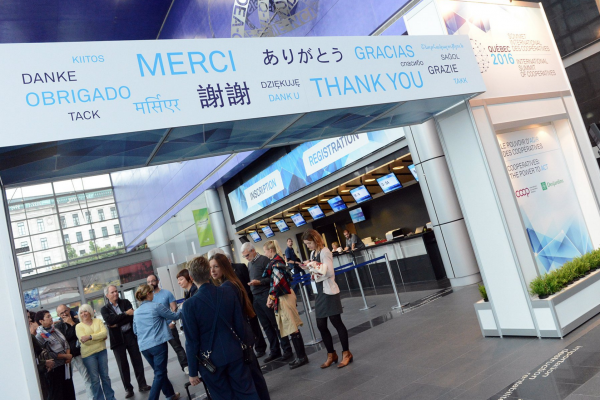January: Ways Forward 4 Conference
Ways Forward 4: Building an Economy to Serve People Not Profit, held in Manchester in January 2016, discussed co-operative and radical alternatives to austerity and capitalism. Contributors included shadow chancellor John McDonnell MP, Fire Brigades Union general secretary Matt Wrack and Co-operatives UK secretary general Ed Mayo.
- Mr McDonnell said a future Labour government would seek to grow co-operatives and give employees the chance to buy their companies in the case of them being closed or sold. A Labour government would also take forward Graeme Nuttall’s report on employee ownership commissioned under the coalition government, he said.
- Delegates at the event discussed the advantages and pitfalls of the worker co-operative model.
- Journalist and Kurdistan correspondent John Hunt chaired an illuminating discussion with Alan Semo, a representative of the PYD (Democratic Union Party) from Rojava, northern Syria, looking at the co-ops rebuilding parts of the war-torn country.
- Green Party MEP Molly Scott Cato called for a new economic model that has co-operation at its heart.
- Mutuals could be a Trojan horse for privatisation, warned Matt Wrack, general secretary of the Fire Brigade Union, adding that sometimes co-operatives and mutuals can get captured by the market conditions.

March: 2016 Co-operative Retail Conference
Co-operatives UK’s Co-operative Retail Conference is an annual event designed specifically for co-operative retailers. On the weekend of 4-6 March 2016, leaders, managers and directors of consumer owned retail co-ops from across the UK gathered in Stratford-upon-Avon to learn from experts, meet with peers and discuss how their businesses are responding in a challenging retail climate. Delegates heard keynote presentations from industry specialists and discussed the co-operative retail environment, looking at values, change, and learning lessons.
- Co-operatives UK announced a ‘£100m challenge’ to UK retail co-operatives – to set a target, over time, of realising £100m worth of gains on an annual basis, through reduced staff turnover.
- IGD Retail Analysis‘ chief economist, James Walton, warned: “There is change on the way”, pointing to unprecedented consecutive months of deflation and the government’s National Living Wage.
- Professor Leigh Sparks, from the Institute of Retail Studies at Stirling University, raised the issue of how co-ops and places share the same two characteristics – both are about identity and community. How can co-ops innovate and reinvent their towns?
- Arttu Laine, executive vice-president of Finnish retail co-op network SOK Corporation, spoke of how a major contributor to SOK’s success is its commitment to making sourcing alliances, not just nationally but internationally.
March: Abcul conference and AGM
The Association of British Credit Unions (Abcul) held its annual conference and AGM in Manchester from 11-13 March. Delegates heard discussions on growing the movement, finding future markets and the regulation of credit unions
- Anthony Elliott, chief executive of the Fairbanking Foundation, Discussed how the Fairbanking accreditation could help credit unions.
- Matt Bland, Abcul’s head of policy and communications, discussed how regulators and a “supportive government” have been making efforts to support credit unions.
- Industry experts discussed how new markets – such as the auto and mortgage sectors – had to be found to expand the credit union movement.
- Financial Conduct Authority chair, John Griffith-Jones, discussed the FCA’s role in helping credit unions to grow, particularly in enhancing competition to the benefit of consumers and bringing new players to the market.
April: Co-operative Education Conference 2016
The 2016 Co-operative Education Conference, organised by the Co-operative College, brought together co-operators, practitioners, researchers and students from around the world to explore the latest ideas and developments in co-operative learning. Held from 21 to 22 April in Manchester, the event was divided into two main sections: research and education. But the conclusion from both days was the same – great things happen when people co-operate.
- Linda Shaw, former vice principal of the Co-operative College, looked at how the movement could build on past achievements to promote co- operative research – and presented research looking at co-operative education during the period following World War II.
- Karl Birkhölzer from Technet Berlin, looked at the common features of co-ops and social enterprises to explore to what extent co-operatives are social enterprises.
- Karen Miner, managing director of the Cooperative Management Education Program at St Mary’s University in Nova Scotia, Canada, explored co-operative business education (CBE) – and why CBE uptake can sometimes be so low.

June: Co-operative Congress 2016
On 17 and 18 June, co-operators gathered for the annual Co-operative Congress at Unity Works in Wakefield. Unity Works was built in 1901 as the home of the Wakefield Industrial Co-operative Society. Day one saw the Co-operatives UK and Co-operative Press AGMs along with the presentation of the Co-operative of the Year Awards and the Co-operative News Big Debate. On day two, broad-ranging sessions at Congress included keynote speakers on the co-operative economy, community projects, the newly-launched National Co-operative Development Strategy, and Dragon’s Den-style pitches.
- In a special debate hosted by Co-operative News, Natalie Bradbury (Co-op College), Rebecca Harvey (Co-op News), Shaherazad Umbreen (Central England) and Britta Werner (Unicorn Workers Co-operative) led discussions around gender equality in the co-operative movement.
- Ann Pettifor, analyst of the global financial system and director of Prime Economics, spoke on how workers should be in control of platforms such as Uber and Airbnb.
- Ed Mayo presented details of the Strategic Reference Panel, which Co-operatives UK set up earlier this year to oversee the delivery of a National Co-operative Development Strategy. Separate sessions explored three themes: co-operative excellence; co-operation among co-operatives; and innovation.
July: World Credit Union Conference
The World Credit Union Conference is an annual credit union education and networking event, this year held in Belfast from 17-20 July. The conference, organised by the World Council of Credit Unions (Woccu) attracts more than 1,700 credit union executives and volunteers from over 50 countries around the globe to discuss membership growth, advocacy, technology and the future of financial services.
- In a world of disruptive change, credit unions must prepare for uncertainty – but predicting future trends can be a great challenge said keynote speaker Professor Ian Goldin
- A former White House chief information officer, Theresa Payton, told credit union representatives that cyber security should be one of the main topics on their agenda.
- Delegates heard how credit unions need to be ready to embrace digital technology – and how mobile has become key to credit union member relationship.
- Good regulation of credit unions should be proportional and take into account the potential impact on economic growth – and not place extra burdens, argued Prof Donal McKillop from Queen’s University Belfast
- Mark Sievewright, president of credit union solutions at Fiserv, looked at 10 predictions for the future of retail financial services.
- Daniel Burns from Canada was been elected chair of the World Council of Credit Unions at the organisations annual meeting, which took place during the conference. Martha Durdin from the Canadian Credit Union Association and George Ototo from Kenya Union of Savings and Credit Co-operatives were also elected to the board.

September: Community Energy Conference
The 2016 Community Energy Fortnight, organised by the Community Energy Coalition and supported by Co-operative Energy, ran from 3-18 September, and kicked off in Oxford with the fourth Community Energy Conference. It’s a chance for community energy groups – including co-operatives – to showcase inspiring examples of communities who are sharing their resources and generating renewable energy and wasting less.
- Dr Andreas Wieg, of the -Deutsche Genossenschafts- und Raiffeisenverband e.V. (DGRV), the federation for German co-operatives, shared experiences of NIMBYism, and how community involvement is key to community energy success.
- Dr Gillie, the founder of Energy Local, spoke about how community energy should be about matching community generation with community usage.
- During the Fortnight, data released by Co-operatives UK revealed an 80% drop in community owned energy after u-turns by the government.
- Community energy organisations from around the UK – including co-operatives – were recognised at the 2016 Community Energy Awards.
- Research released by Co-operative Energy showed that more than two-thirds (67%) of the 2,000+ UK adults polled for the research said they would support local community-owned renewable energy projects, such as wind turbines, while nearly 80% thought the government should do more ‘to help local communities generate their own energy, with profits staying in the area’.
September: Co-operative Party Conference
The 2016 Co-operative Party Conference took place on 9-11 September in Cardiff. 2015 was a challenging year, but there are positive stories to tell, general secretary Claire McCarthy told delegates.
- The Party published a report on the role of co-ops in social care, arguing that employee and service user ownership is crucial to addressing the crisis in social care provision.
- A panel looked at ways to build a shared economy in a world where workers’ rights are facing ever growing threats.
- Delegates also debated how Britain’s departure from the EU will take shape on a practical level.

October: International Summit of Co-operatives 2016
Between 11-13 October 2016, over 3,000 delegates from across the world gather in Quebec for the third edition of the International Summit of Cooperatives, under the theme ‘Cooperatives: The Power to Act’.
- Economist Jeremy Rifkin presented a stark picture of life over the next eight decades, but he is also optimistic about people’s ability to use co-ops to develop new economies for a better, more inclusive and environmentally friendly future.
- Economist Robert Reich thinks that many Western countries are witnessing a crisis of capitalism, which can be overcome if co-ops spread their business model and become more visible.
- At the end of the final day of the Summit, co-operators around the world made a commitment to the United Nation’s Sustainable Development Goals (SDGs). On the same day, five UN ambassadors called on the co-operative movement to step up in the business world.
- Co-ops help people live better with less, according to innovation adviser, Navi Radjou, who has written extensively about the concept of frugal innovation.
- A changing political landscape and economic challenges mean we are witnessing “interesting” but “unsettling” times, warned economist Joseph Stiglitz.
- Mark Kramer, founder and managing director of consulting firm FSG, spoke about how a competitive advantage exists for co-operatives if they work together across industries to solve problems within society.
November: Practitioners Forum
The 2016 Practitioners Forum, organised by Co-operatives UK, took place on 17 November in Manchester, and offered professional training for people operating in key roles in co-operative businesses large and small. The one-day conference included five specialist forums – communications, governance, HR, membership and finance – giving delegates an opportunity to learn from experts and network with peers.
- Experts in member engagement told delegates that co-ops should listen to members’ views and develop products that keep their needs in mind.
- Co-operative human resources professionals and delegates debated how co-ops can be fair employers and avoid unfair dismissal claims.
- Minnie Moll, joint chief executive of the East of England Co-operative, shared best practices from the society and tips for building a successful co-operative brand.
- Colin Murray, partner at DWF Solicitors, answered some of the questions around the legal implications of Brexit for co-ops.